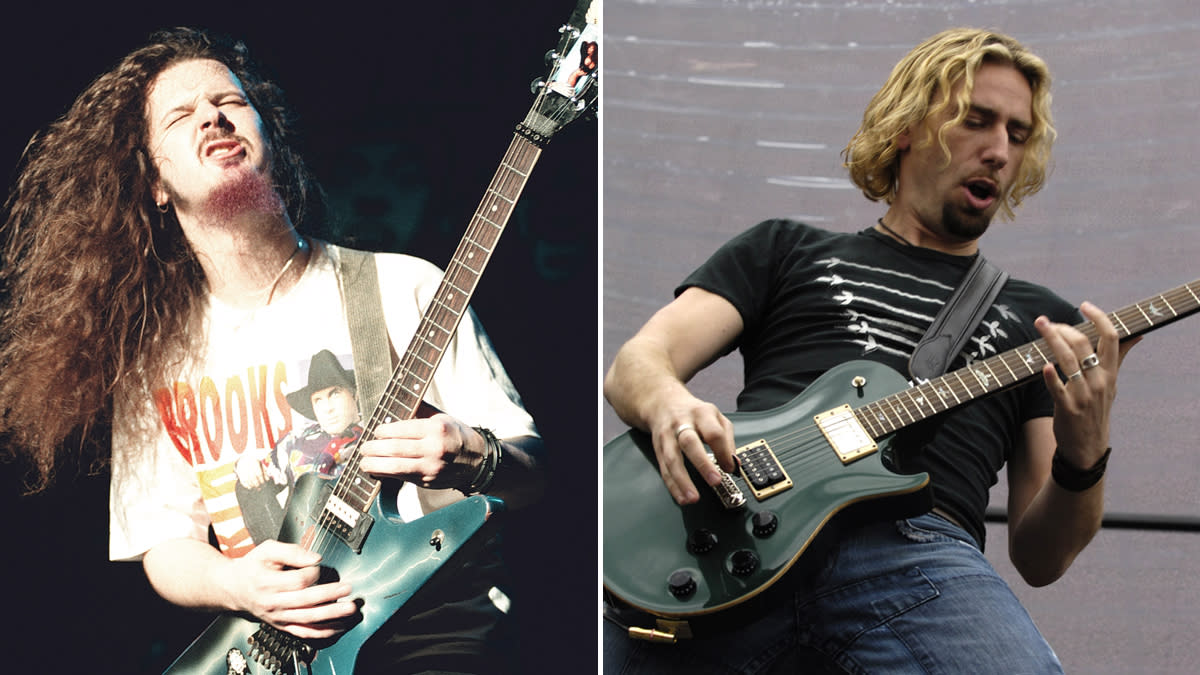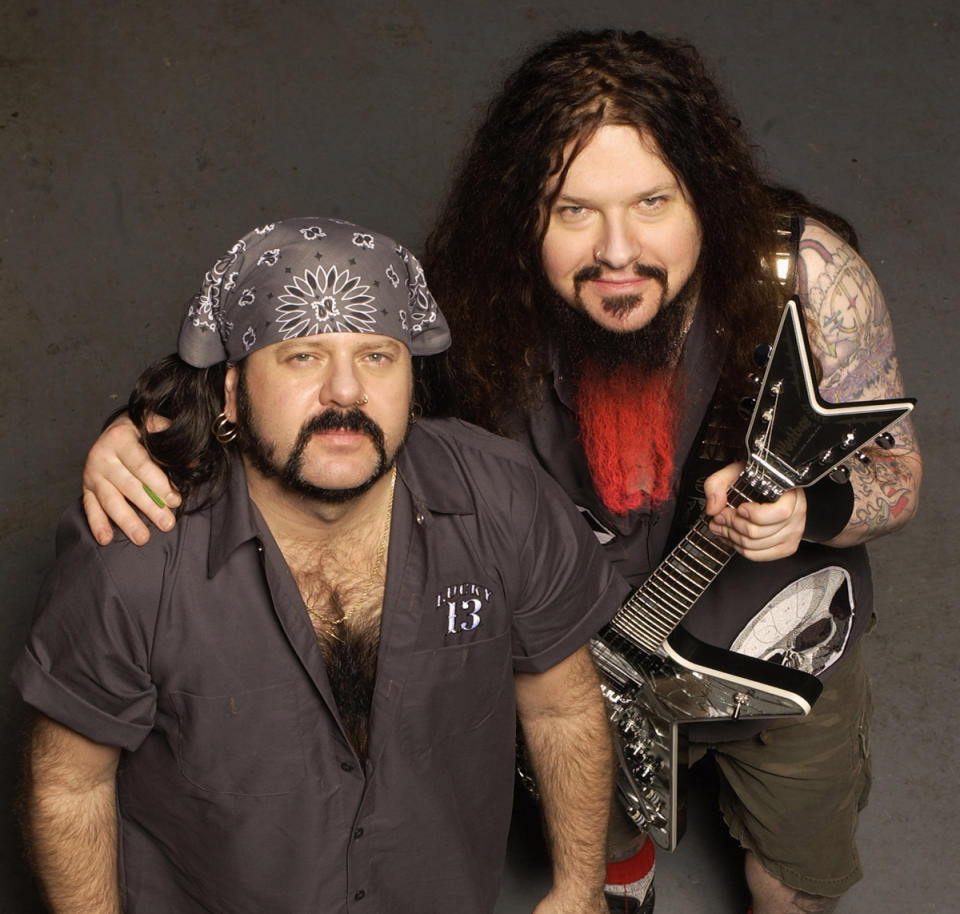How an unreleased Dimebag Darrell guitar solo ended up on Nickelback’s best-selling album

- Oops!Something went wrong.Please try again later.
- Oops!Something went wrong.Please try again later.
- Oops!Something went wrong.Please try again later.
When he wasn’t tearing up stages with a Dean ML slung over his shoulder, Dimebag Darrell was probably drinking. And he loved to make new drinking buddies.
That’s how Pantera’s paths first crossed with Nickelback. Introduced by Jerry Cantrell, who was supporting the then-ascendent Canadian rock outfit back in 2002, the two bands struck up a whiskey-fueled friendship.
“We’d known the Pantera guys since a really early time in our career,” bassist Mike Kroeger recalled in a 2020 interview with Australian Guitar. “They were fans of ours from the beginning, and we would always see them out on the road or whenever we would go through Dallas; they would come out and ply us with alcohol.”
Naturally, Dimebag’s brother and partner in groove metal Vinnie Paul Abbott partook in these drinking sessions, and after a few too many, admitted he listened to Nickelback “every day”, frontman Chad Kroeger told MTV back in 2005.
“[It] really surprised me,” Kroeger said. “But I guess they come from that whole Southern-rock background, and we're a hard-rock band with Southern-rock influences, so they liked it a lot.”
This unlikely bond was fortified when, after a 2003 show in Dallas, Chad played Dimebag a demo of Nickelback’s take on Elton John hit Saturday Night's Alright for Fighting. The band were in the process of recording a studio version for the Charlie’s Angels: Full Throttle soundtrack, featuring Kid Rock.
Dimebag ended up liking their rendition so much, he tracked a solo for the collaborative effort, which showcased his ability to deliver astonishing Southern-fried pentatonic flurries at the drop of a hat.
Darrell’s career was in flux at the time of the high-profile guest spot: Pantera had disbanded, and he was just starting over with new outfit Damageplan, alongside his brother.
But as Damageplan sought to build their own fanbase with a US club tour, tragedy struck: on December 8 2004, Dimebag was gunned down onstage in Columbus, Ohio by a crazed fan. He was 38.
The murder hit the music community hard. The likes of Jerry Cantrell, Zakk Wylde and Corey Taylor attended Dimebag’s memorial, and Eddie Van Halen donated his original black-and-yellow-striped 1979 Charvel, aka “Bumblebee”, to lay beside Dimebag in his casket.
Chad Kroeger was also devastated. “I was very upset, and for two months, if I saw his picture somewhere I would get angry,” he told MTV. “I hadn't lost somebody to a shooting before – it wasn't as though he'd been killed in some sort of accident. He was taken in such a horrible, malicious way that just made it more painful.”

The frontman was inspired to address his feelings in a song he titled Side of a Bullet, written from the perspective of a Pantera fan who seeks revenge on Dimebag’s killer.
Kroeger played the Southern metal-inspired track to Vinnie Paul, and invited the Pantera drummer to retake the drum track recorded by Nickelback sticksman Daniel Adair. Abbott ultimately concluded that there was nothing he could add – but there was something Dimebag could contribute.
With the permission of Dimebag’s girlfriend Rita Haney, the drummer sent Kroeger a number of solo outtakes from classic Pantera albums Vulgar Display of Power and Far Beyond Driven, recorded between 1991 and 1993. The gesture meant a lot to the band.
“They were our brothers,” Mike Kroeger said. “And then when Dime was murdered, we wanted to pay tribute to him. We were able to get some of his unused solos and a few other bits of his playing that we would actually lay into the track… It was a really special thing for us.”
Despite being stitched together, the resultant lead serves as a potent reminder of the gifts Dimebag had to offer the guitar world: his groaning bends, whammy dives and ferocious legato gels surprisingly seamlessly with Kroeger’s stomping metal-edged riffs and Adair’s double-kick drum grooves.
The song was released on Nickelback’s 2005 album All the Right Reasons, and became the record’s seventh and final single. It was a surprisingly heavy pick for radio play, particularly given it followed good-time singalong Rockstar and saccharine ballad If Everyone Cared.
A lot of people didn’t like the fact that they were friends with us, or fans of our music – but the metal world can be a little intense to its own
All the Right Reasons became Nickelback’s best-selling album and went on to rack up sales of 11 million copies worldwide – nearly eight million of these were from the US, making it one of the best-selling albums of all time in North America (at the time of writing, it sits above Eric Clapton’s Unplugged, and just below Led Zeppelin’s Physical Graffiti).
Given Nickelback’s reputation as mainstream rock’s ultimate love ’em or hate ’em artist, their success continues to mystify non-believers. But that’s precisely why Dimebag’s friendship – and musical contributions – meant so much.
“The guy was a legend, as well as his brother – that whole band was,” Mike Kroeger says.
“A lot of people didn’t like the fact that they were friends with us, or fans of our music – but the metal world can be a little intense to its own, y’know? So it was just really cool that they didn’t care about that, and they just wanted to be friends with us because they liked what we did.”

